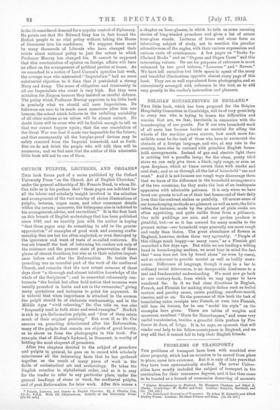BELGIAN HOUSEKEEPING IN ENGLAND.* This little book, which has been
prepared for the Belgian Hospitality Committee in Cambridge, will be of very great help to every one who is trying to lessen the difficulties and worries that are, we fear, inevitable in connexion with the housekeeping of our guests. For if our own household work of all sorts has become harder as material for oiling the wheels of the machine grows scarcer, how much more for• midable must be the task of those who have to surmount the obstacle of a foreign language, and who, at any rate in the country, have also to contend with primitive English house- hold arrangements. Instead of gas and electric light there is nothing but a paraffin lamp ; for the clean, pretty tiled stove we can only give them a black, ugly range, or even an open fireplace, which at times covers them with smoke and coal-dust; and so on through all the list of household "use and wont." And it is not because our rough ways discourage them that we learn of the difference in the household arrangements of the two countries, for they make the best of an inadequate apparatus with admirable patience. It is only when we have lured our guests to tell us of their lost homes and of their daily lives that the contrast strikes us painfully. Of course some of our housekeeping methods are pleasant as well as new; the little cakes, for instance, made by the plainest of plain cooks are often appetizing, and quite unlike those from a patisserie. Our milk puddings are nice, and our garden produce is plentiful, but—or so it has seemed for many months to the present writer—our household ways generally are more rough and ready than theirs, The great abundance of flowers in England, however, strikes them very agreeably. "People of this village much happy—so many roses," as a Flemish girl remarked a few days ago. But while we are lending a willing hand in housekeeping matters, we must bear in mind the fact that " man does not live by bread alone " (or even by mires), and so endeavour to provide mental as well as bodily suste- nance. Difference of language, though it may be a bar to ordinary social intercourse, is no insuperable hindrance to a real and fundamental understanding. We must now go back to our cookery-book, from which we may appear to have wandered far. In it we find clear directions in English, French, and Flemish for making simple dishes such as boiled mutton and parsley sauce, raisin pudding, cornflour-mould, rissoles, and so on. To the possessor of this book the task of translating extra receipts into French, or even into Flemish, will lose its terrors, for he can "model his style" on the examples here given. There are tables of weights and measures, excellent "Hints for Housekeepers," and some very useful vocabularies, besides a graceful little preface by Pro. fessor de Jure, of Li6ge. It is, be says, an opuseule that will render real help to his fellow-countrymen in England, and we may add that it cannot fail to help their English friends.


































 Previous page
Previous page